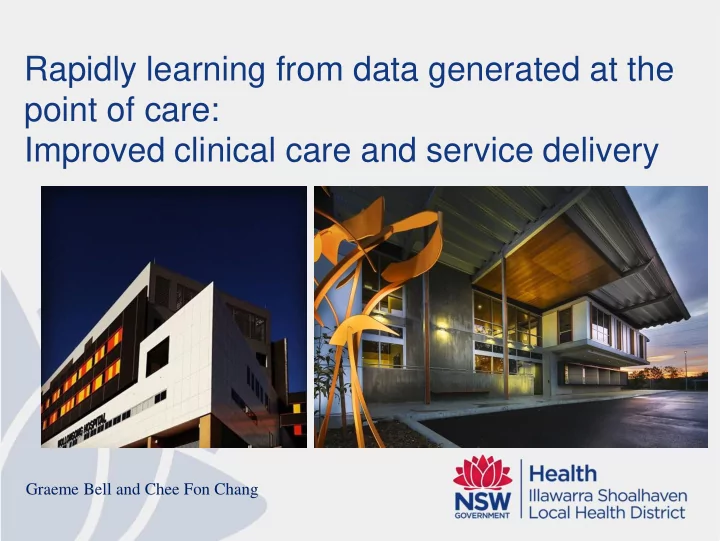

Rapidly learning from data generated at the point of care: Improved clinical care and service delivery Graeme Bell and Chee Fon Chang
Outline Foundation (roots) Core (fertiliser, care and pruning) Outcomes/ Benefits (fruits)
Foundation (Roots) Rapid Learning System (RLS) Outcome Measurement Oncology Information System
Foundation - RLS Etheredge defined a rapid learning health care model as one that generates as rapidly as possible the evidence needed to deliver quality patient care 1 Users learn as much as possible as soon as possible through the collection of data at the point of care that can then be used to inform clinical care and service delivery Whilst this model has been developed around the concept of “big data”, it is also possible to apply it at a localised level to achieve similar outcomes 1. Abernethy et al, 2010
RLS
Challenges for Big Data and RLS Data correctness Data completeness Data consistency Data storage
Foundation – Outcome Measurement Ernest Codman Visionary surgeon from early 1900’s The “end result idea” “Every hospital should follow every patient it treats long enough to determine whether or not the treatment has been successful, and then to inquire, “if not, why not?” with a view to preventing similar failures in the future and to improving the efficiency of care .” 2 2. Codman 1925
Ernest Codman “By grouping cases into series large enough to favour comparative study and by observing definite previously determined points, a rational and clinical science can be developed.” 3 3. Codman 1922
Foundation – Outcome Measurement ICHOM metrics (standardise collection points) “ICHOM’s mission is to unlock the potential of value- based health care by defining global Standard Sets of outcome measures that really matter to patients for the most relevant medical conditions and by driving adoption and reporting of these measures worldwide .”
Outcome Measurement ICHOM is now in process of developing “Standard Sets” for outcome measurement (Codman’s “end result”) Whilst ICHOM’s model has been developed for international benchmarking and comparison, we can also use the unique and well defined standard sets to measure our outcomes locally
Core (Fertiliser, Care and Pruning) You can only pull out what you've put in Ensure quality and completeness of data Use of manual and automated QA's Regular staff training, education and support Data needs to be accessible and actionable for clinicians
Clinical Projects (Fruits) – Harvest No. 1 Clinical dash board Chemotherapy protocols – different protocols dependent upon diagnosis, stage, co-morbidities Protocols administered in “cycles”, which are either weekly, fortnightly, 3 weekly or 4 weekly. Gold standards in curative disease, greater variability in palliative setting Dash board not solely a tool for clinicians, we also hope to develop an option for patient viewing, so that they can be walked through treatment options, empowering them in their own treatment decision
Clinical Dashboard – Ipilimumab (systemic treatment for metastatic melanoma)
Dashboard - Ipilimumab
Clinical Dashboard – Toxicities and Demographics
Clinical Dashboard – Comparison Ipilimumab vs Nivolumab
Clinical Dashboard - Comparison
Dashboard Difficulties Similar to large scale difficulties – Incomplete data entry, inconsistent data entry, incorrect data entry Survival outcomes, particularly for positive prognostic early stage dx (breast, colon etc), requires lengthy time for measurement of PFS rates and OS rates
Operational Project (Fruits) – Harvest No. 2 Scheduling project
Schedule Project Noted patients consistently over scheduled appointment time in our chemotherapy suite Schedule times based on eviQ suggested treatment times Certain protocols, certain cycles and ?? certain types of patients appeared to have greater delays than others Inaccurate scheduling resulted in extended wait times for patients on day of treatment
Investigate Use of an OIS provides intricate data to reach statistically significant conclusions Ability to track times of attendance, treatment commencement and completion, departure time Additional timestamps such as pre-treatment assessment, medication start and finish times, cannulation attempts Additional patient variables are also able to be investigated including: ECOG, BSA, Age, Gender
Investigate
Now have the ability to: Identify bottlenecks within the patient journey Adjust and Implement measure as quality required initiatives Measure the effect of initiatives rapidly in real time
In the future, we will have the ability to: Personalise patient scheduling Predict delays Pre-empt toxicity and manage Automate and improve scheduling
Conclusion Able to extract, aggregate and analyse data generated at point of care to inform and optimise patient care Ability to identify and measure patterns and trends in real time There are holes in the data – requires continued audit and QA Engage with staff, make the data presentable and actionable, giving a reason for complete and correct data entry
Thanks Chee Fon Chang Anthony Arnold Amy Hains
References Abernethy AP, Etheredge LM, Ganz PA et al. Rapid-Learning System for Cancer Care. Journal of Clinical Oncology. 2010;28(27): 4268-4274 Codman EA. Bone Sarcoma: An Interpretation of the Nomenclature Used by the Committee on the Registry of Bone Sarcoma of the American College of Surgeons . New York: Paul B. Hoeber, Inc., 1925. Codman EA. The registry of cases of bone sarcoma. Surg Gynecol Obstet . 1922;34:335-343. Stowell, C 2015, ICHOM, Workshop Videos; Agency for Clinical Innovation. Accessed 10 July 2015 <http://www.aci.health.nsw.gov.au/about-aci/newsroom/measuring-outcomes-that- matter-most-to-patients/ichom-workshop-videos> Warshaw, A 2014, Presidential Address: Achieving our personal best: Back to the future of the American College of Surgeons. Accessed 10 July 2015 <http://bulletin.facs.org/2014/12/presidential-address-achieving-our-personal-best-back-to-the- future-of-the-american-college-of-surgeons />
Recommend
More recommend